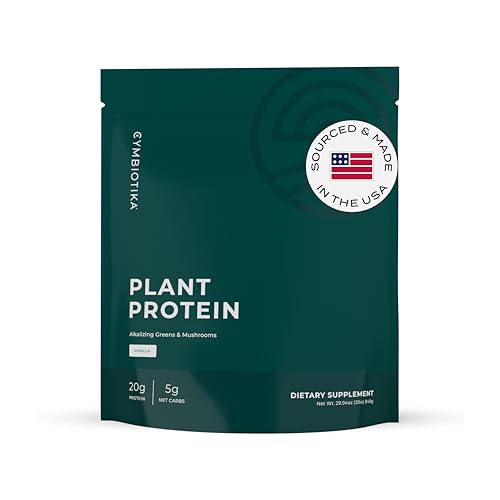
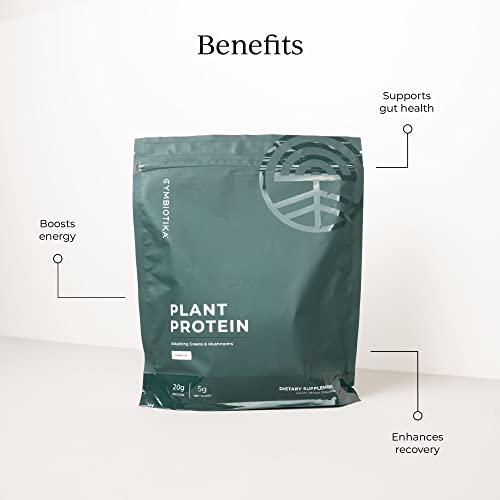
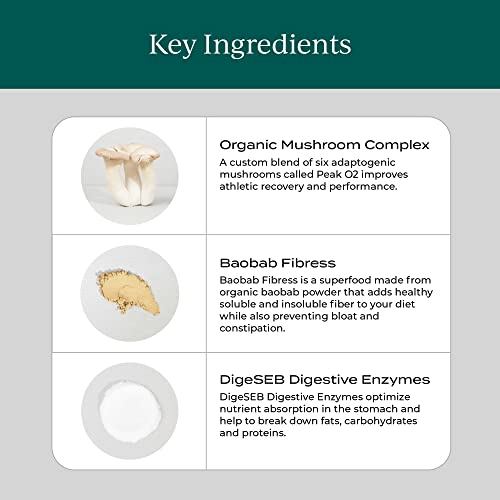
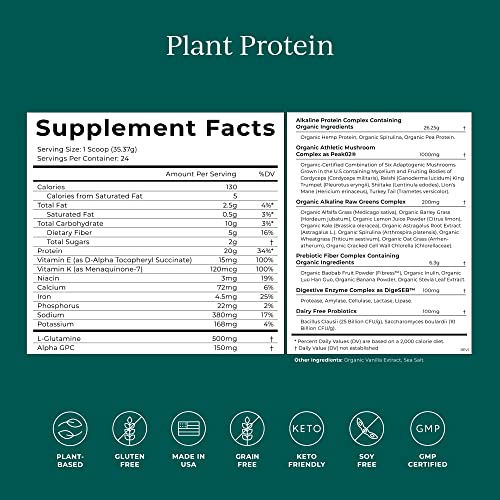
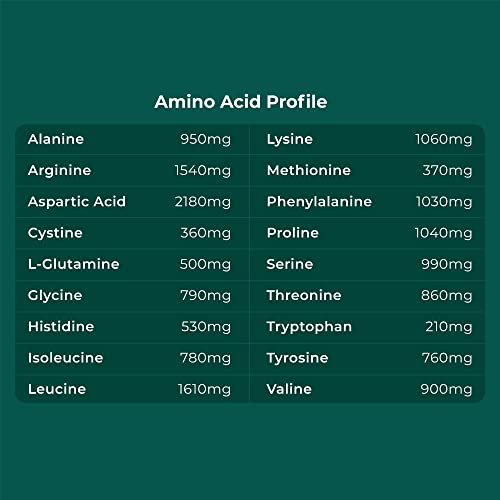

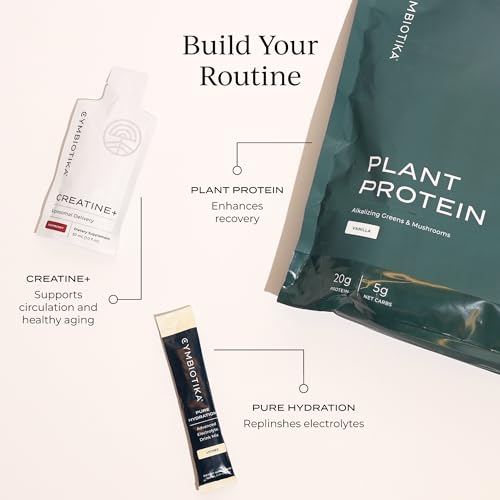
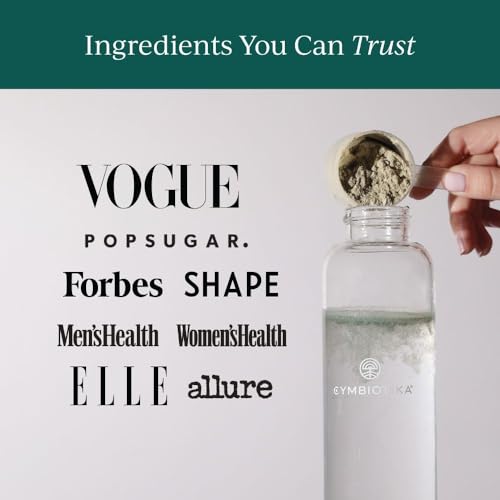

CYMBIOTIKA Protein Powder - Supports Energy, Recovery & Gut Health, Low Carb, Vegan - Vanilla, 2 lb


Lipase
Medium RiskLipase is an enzyme that hydrolyzes triglycerides, facilitating the digestion and absorption of fats in the body. It plays a crucial role in lipid metabolism and is commonly used in various food and dietary products to enhance fat breakdown.
Sustai Insights
Lipase serves as an effective digestive aid, promoting fat metabolism and improving nutrient absorption. It is generally recognized as safe, with low concerns regarding carcinogenicity and developmental toxicity. However, there is a moderate risk of allergies and immunotoxicity. Environmental impacts are minimal, but regulatory bodies have placed some restrictions on specific uses. Overall, the risk level is assessed as medium, and users should follow safe usage recommendations. Alternatives such as other digestive enzymes may offer similar benefits.
Cellulase
Low RiskCellulase is an enzyme that breaks down cellulose into simpler sugars. It is commonly used in detergents to remove plant-based stains and in food processing to enhance the digestibility of plant materials. Cellulase is derived from microbial sources and functions effectively under controlled conditions.
Sustai Insights
Cellulase offers valuable functional benefits, including its ability to efficiently degrade cellulose, making it highly effective for stain removal and food processing applications. It is generally regarded as safe, with low health risks; rare allergic reactions have been reported but remain uncommon. Environmentally, cellulase has a negligible pollutant potential and is biodegradable, contributing to its sustainability profile. Regulatory bodies such as the FDA and EU agencies permit its use, provided it meets established purity and safety standards. Overall, cellulase is classified as a low-risk ingredient. Safe use involves adhering to recommended concentrations to minimize any allergenic potential. Sustainable microbial production and the absence of significant environmental hazards enhance its appeal, with no direct substitutes offering comparable functionality and sustainability benefits.
Amylase
Low RiskAmylase is an enzyme that catalyzes the breakdown of starches into sugars. It is commonly used in food processing, detergents, and other industrial applications to enhance product functionality. Its effectiveness depends on specific conditions, such as temperature and pH, making it versatile in applications ranging from baking to stain removal.
Sustai Insights
Amylase offers functional benefits by efficiently breaking down starches, enhancing food texture and cleaning performance. It is widely recognized as safe and biodegradable, aligning with sustainability goals. However, exposure may pose irritation risks for individuals with enzyme allergies, particularly through inhalation or skin contact. Regulatory assessments classify amylase as generally safe, with no carcinogenic or endocrine-disrupting properties reported. Environmental risks are minimal due to its natural degradability, and its use in products typically adheres to stringent safety standards. While alternative enzymes exist, amylase remains a preferred choice due to its efficiency and low overall risk, which is considered manageable with appropriate precautions.
Protein
Low RiskProtein is a macromolecule composed of amino acids, serving various functions such as structural support, transport, and catalysis within biological systems. It is commonly used in food products and dietary supplements for its role in muscle repair, growth, and overall health.
Sustai Insights
Protein is essential for various biological functions, including muscle repair and growth, making it a valuable ingredient in food and supplements. It is generally considered safe, with low concerns for carcinogenicity, allergies, and developmental toxicity. However, it is important to source protein sustainably to minimize environmental impact. Regulatory bodies do not currently impose restrictions on protein use, indicating a low risk level overall. Safe usage practices include moderation in consumption, and alternatives such as plant-based proteins may be considered for sustainability.
Inulin
Low RiskInulin is a polysaccharide that functions primarily as a dietary fiber and prebiotic, often used to enhance the texture and nutritional profile of various food products. It is derived from plants like chicory and is known for its ability to improve digestive health and promote beneficial gut bacteria.
Sustai Insights
Inulin offers functional benefits as a prebiotic, supporting gut health and enhancing food texture. It is biodegradable and sustainably sourced from plants, contributing to environmentally friendly practices. Health risks are low, with minimal concerns regarding carcinogenicity and allergies. While regulatory restrictions apply to certain products, overall, the ingredient is considered low risk. Safe usage involves adhering to recommended dietary levels, and alternatives like other soluble fibers can be considered for those seeking different options.
Citrus Limon (Lemon)
Low RiskCitrus limon, commonly known as lemon, is a citrus fruit used primarily for its juice and zest. It is often included in personal care products for its astringent properties and as a natural fragrance. It is recognized for its potential antioxidant benefits and as a source of vitamin C.
Sustai Insights
Citrus limon offers functional benefits like acting as a natural preservative and providing fragrance in formulations. It is sustainably sourced and biodegradable. Health risks are considered low for carcinogenicity, allergies, and reproductive toxicity. Environmental risks are minimal, with no significant bioaccumulation. Regulatory status is favorable, with no current restrictions noted. Overall, this ingredient poses a low risk, making it a safe choice for consumers.
Glycerophosphocholine
Low RiskGlycerophosphocholine is a compound derived from glycerol and phosphocholine, primarily functioning as a phospholipid precursor. It is often used in dietary supplements and cosmetic formulations, contributing to cellular function and signaling processes.
Sustai Insights
Glycerophosphocholine offers functional benefits as a cellular health promoter and is considered low risk for health concerns, with minimal allergenic or toxic effects. Environmentally, it does not pose significant pollution or bioaccumulation risks. Regulatory assessments indicate no major advisories against its use, affirming its safety profile. Overall, it is evaluated as low risk, though consumers should consider alternatives like phosphatidylcholine for similar benefits.
Spirulina
Low RiskSpirulina is a blue-green microalga known for its high nutritional profile, including proteins, vitamins, and antioxidants. It is commonly used as a dietary supplement and ingredient in health foods, offering various functional benefits such as promoting energy and supporting immune health.
Sustai Insights
Spirulina is recognized for its functional benefits, including high protein content and antioxidant properties, making it a valuable dietary supplement. It is sustainably sourced and biodegradable. Health risks are minimal, with low concerns regarding carcinogenicity, allergies, or reproductive toxicity, and it is not subject to significant regulatory restrictions. Overall, the risk level is assessed as low, indicating a favorable profile for use in food and supplements.
Cellulase
Low RiskCellulase is an enzyme that breaks down cellulose into simpler sugars. It is commonly used in detergents to remove plant-based stains and in food processing to enhance the digestibility of plant materials. Cellulase is derived from microbial sources and functions effectively under controlled conditions.
Sustai Insights
Cellulase offers valuable functional benefits, including its ability to efficiently degrade cellulose, making it highly effective for stain removal and food processing applications. It is generally regarded as safe, with low health risks; rare allergic reactions have been reported but remain uncommon. Environmentally, cellulase has a negligible pollutant potential and is biodegradable, contributing to its sustainability profile. Regulatory bodies such as the FDA and EU agencies permit its use, provided it meets established purity and safety standards. Overall, cellulase is classified as a low-risk ingredient. Safe use involves adhering to recommended concentrations to minimize any allergenic potential. Sustainable microbial production and the absence of significant environmental hazards enhance its appeal, with no direct substitutes offering comparable functionality and sustainability benefits.
Amylase
Low RiskAmylase is an enzyme that catalyzes the breakdown of starches into sugars. It is commonly used in food processing, detergents, and other industrial applications to enhance product functionality. Its effectiveness depends on specific conditions, such as temperature and pH, making it versatile in applications ranging from baking to stain removal.
Sustai Insights
Amylase offers functional benefits by efficiently breaking down starches, enhancing food texture and cleaning performance. It is widely recognized as safe and biodegradable, aligning with sustainability goals. However, exposure may pose irritation risks for individuals with enzyme allergies, particularly through inhalation or skin contact. Regulatory assessments classify amylase as generally safe, with no carcinogenic or endocrine-disrupting properties reported. Environmental risks are minimal due to its natural degradability, and its use in products typically adheres to stringent safety standards. While alternative enzymes exist, amylase remains a preferred choice due to its efficiency and low overall risk, which is considered manageable with appropriate precautions.
Protein
Low RiskProtein is a macromolecule composed of amino acids, serving various functions such as structural support, transport, and catalysis within biological systems. It is commonly used in food products and dietary supplements for its role in muscle repair, growth, and overall health.
Sustai Insights
Protein is essential for various biological functions, including muscle repair and growth, making it a valuable ingredient in food and supplements. It is generally considered safe, with low concerns for carcinogenicity, allergies, and developmental toxicity. However, it is important to source protein sustainably to minimize environmental impact. Regulatory bodies do not currently impose restrictions on protein use, indicating a low risk level overall. Safe usage practices include moderation in consumption, and alternatives such as plant-based proteins may be considered for sustainability.
Inulin
Low RiskInulin is a polysaccharide that functions primarily as a dietary fiber and prebiotic, often used to enhance the texture and nutritional profile of various food products. It is derived from plants like chicory and is known for its ability to improve digestive health and promote beneficial gut bacteria.
Sustai Insights
Inulin offers functional benefits as a prebiotic, supporting gut health and enhancing food texture. It is biodegradable and sustainably sourced from plants, contributing to environmentally friendly practices. Health risks are low, with minimal concerns regarding carcinogenicity and allergies. While regulatory restrictions apply to certain products, overall, the ingredient is considered low risk. Safe usage involves adhering to recommended dietary levels, and alternatives like other soluble fibers can be considered for those seeking different options.
Citrus Limon (Lemon)
Low RiskCitrus limon, commonly known as lemon, is a citrus fruit used primarily for its juice and zest. It is often included in personal care products for its astringent properties and as a natural fragrance. It is recognized for its potential antioxidant benefits and as a source of vitamin C.
Sustai Insights
Citrus limon offers functional benefits like acting as a natural preservative and providing fragrance in formulations. It is sustainably sourced and biodegradable. Health risks are considered low for carcinogenicity, allergies, and reproductive toxicity. Environmental risks are minimal, with no significant bioaccumulation. Regulatory status is favorable, with no current restrictions noted. Overall, this ingredient poses a low risk, making it a safe choice for consumers.
Lipase
Medium RiskLipase is an enzyme that hydrolyzes triglycerides, facilitating the digestion and absorption of fats in the body. It plays a crucial role in lipid metabolism and is commonly used in various food and dietary products to enhance fat breakdown.
Sustai Insights
Lipase serves as an effective digestive aid, promoting fat metabolism and improving nutrient absorption. It is generally recognized as safe, with low concerns regarding carcinogenicity and developmental toxicity. However, there is a moderate risk of allergies and immunotoxicity. Environmental impacts are minimal, but regulatory bodies have placed some restrictions on specific uses. Overall, the risk level is assessed as medium, and users should follow safe usage recommendations. Alternatives such as other digestive enzymes may offer similar benefits.
Glycerophosphocholine
Low RiskGlycerophosphocholine is a compound derived from glycerol and phosphocholine, primarily functioning as a phospholipid precursor. It is often used in dietary supplements and cosmetic formulations, contributing to cellular function and signaling processes.
Sustai Insights
Glycerophosphocholine offers functional benefits as a cellular health promoter and is considered low risk for health concerns, with minimal allergenic or toxic effects. Environmentally, it does not pose significant pollution or bioaccumulation risks. Regulatory assessments indicate no major advisories against its use, affirming its safety profile. Overall, it is evaluated as low risk, though consumers should consider alternatives like phosphatidylcholine for similar benefits.
Spirulina
Low RiskSpirulina is a blue-green microalga known for its high nutritional profile, including proteins, vitamins, and antioxidants. It is commonly used as a dietary supplement and ingredient in health foods, offering various functional benefits such as promoting energy and supporting immune health.
Sustai Insights
Spirulina is recognized for its functional benefits, including high protein content and antioxidant properties, making it a valuable dietary supplement. It is sustainably sourced and biodegradable. Health risks are minimal, with low concerns regarding carcinogenicity, allergies, or reproductive toxicity, and it is not subject to significant regulatory restrictions. Overall, the risk level is assessed as low, indicating a favorable profile for use in food and supplements.
Discover the power of CYMBIOTIKA Plant-Based Protein Powder, a premium blend designed for both women and men seeking a nutritious boost. Crafted with organic ingredients, this vegan, soy-free, and gluten-free protein powder promotes energy, recovery, and gut health.
- Nutrient-Rich Formula: Packed with essential vitamins, whole-food nutrients, and a complete amino acid profile, this protein powder supports overall health and vitality.
- Enhanced Recovery: Featuring Peak O2, a blend of six adaptogenic mushrooms, it helps improve recovery time after intense workouts, allowing for optimal performance.
- Gut Health & Energy Boost: Enriched with digestive enzymes and baobab fibers, this powder aids digestion and combats bloating, while boosting cellular energy production for all-day vitality.
- Versatile Usage: Easily mix one serving with water or your favorite milk for a delicious shake, or add it to smoothies and recipes for a nutritious kick.
- Commitment to Quality: Formulated without chemicals or preservatives, this protein powder aligns with Cymbiotika’s mission to provide clean, effective supplements that support a healthy lifestyle.
Subscribe & Save with Sustai
- Best Price Guarantee: Always enjoy the lowest prices on sustainable home essentials.
- No Surprises: We’ll notify you before shipping. No hidden fees, ever.
- You’re in Charge: Change, pause, or cancel your subscription anytime with ease.
- Eco-Friendly Deliveries: Our grouped shipments mean less packaging and lower emissions.
Join us on a sustainable journey. Special offers for a limited time! Prices and promotions may change.
Recommended Products
Discover the power of CYMBIOTIKA Plant-Based Protein Powder, a premium blend designed for both women and men seeking a nutritious boost. Crafted with organic ingredients, this vegan, soy-free, and gluten-free protein powder promotes energy, recovery, and gut health.
- Nutrient-Rich Formula: Packed with essential vitamins, whole-food nutrients, and a complete amino acid profile, this protein powder supports overall health and vitality.
- Enhanced Recovery: Featuring Peak O2, a blend of six adaptogenic mushrooms, it helps improve recovery time after intense workouts, allowing for optimal performance.
- Gut Health & Energy Boost: Enriched with digestive enzymes and baobab fibers, this powder aids digestion and combats bloating, while boosting cellular energy production for all-day vitality.
- Versatile Usage: Easily mix one serving with water or your favorite milk for a delicious shake, or add it to smoothies and recipes for a nutritious kick.
- Commitment to Quality: Formulated without chemicals or preservatives, this protein powder aligns with Cymbiotika’s mission to provide clean, effective supplements that support a healthy lifestyle.

You can have at most 2 Sustainable Steals products in your cart
Customer Reviews
Customers’ View
Customers appreciate the high-quality, plant-based ingredients of this protein powder, which align with their health and eco-conscious values. Many users note the effective blend of essential amino acids and probiotics, contributing to improved gut health and energy levels. One reviewer highlighted the product's versatility, suggesting it mixes well with smoothies and shakes, while another mentioned its natural and earthy flavor, making it a satisfying addition to their diet. Although some customers find it a bit pricey, they feel the health benefits justify the cost. Overall, this protein powder is well-regarded for its clean formulation and support for an active lifestyle.
AI-generated from the text of customer reviewsThis product is rated 5.0 of 5.0 stars.
It has received 4 reviews.




